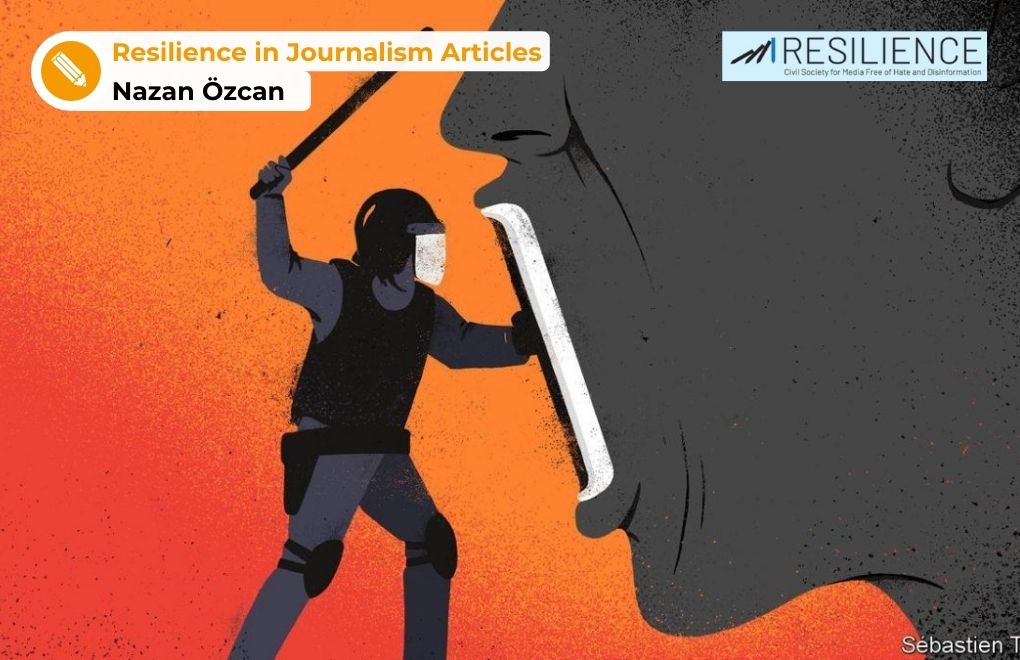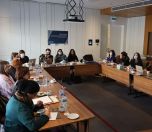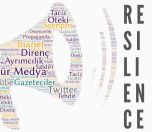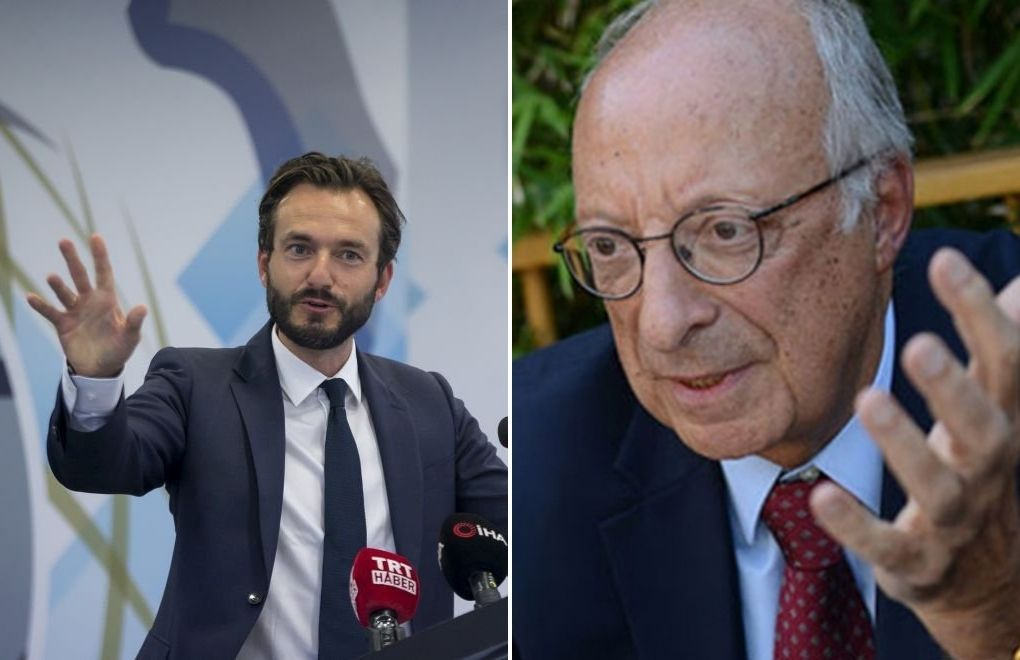* Image: The Economist
Click to read the article in Turkish
This article has been published as part of the "Resilience in Journalism" article series which sets out to offer critical reviews exemplifying hate speech and disinformation in the media as part of the Resilience Project, of which the IPS Communication Foundation / bianet from Turkey is one of the partners. |
Political power holders always try to curb "freedom of expression", which is a must for journalists. It has several examples in the history of the press of both Turkey and the world. Freedom of expression, the "battlefield" between the government and journalists, has been facing attempts of restriction by various tools of the government in Turkey, which has recently become all the more authoritarian. All types of methods are employed to deprive every citizen and of course the press of their most important right with legal decisions, legislations, new regulations or "threats".
Besides, while the government frequently stigmatizes the "freedom of expression" of citizens (mostly dissidents) as "hate speech", the "hate speech" of the government and pro-government circles is seen or portrayed within the scope of freedom of expression. Both the courts and law enforcement act this way, too. Though hate speech and freedom of expression are clearly different, they are now intertwined due to the government's disinformation and manipulation.
Yasemin Giritli İnceoğlu,  a professor of communication science, elaborates on where freedom of expression and hate speech differ and intersect and what obligations journalists and of course citizens have in terms of hate speech and freedom of expression.
a professor of communication science, elaborates on where freedom of expression and hate speech differ and intersect and what obligations journalists and of course citizens have in terms of hate speech and freedom of expression.
CLICK - 'Resilience in Journalism' article series begins
What is hate speech?
The term emerged in the mid-1980s. Critical discourse analyst Van Dijk from the Netherlands says that mind control in society is ensured by controlling or producing the 'discourse'. It would not be right to talk about a year zero but we encounter it more often when xenophobia and racism are on the rise and violence against minorities gains momentum in the world.
The recommendation on hate speech which was adopted by the Committee of Ministers of the Council of Europe in 1997 is also a milestone. And the European Court of Human Rights (ECtHR) abides by this recommendation. In this recommendation, hate speech is defined as "all forms of expression which spread, incite, promote or justify racial hatred, xenophobia, anti-Semitism or other forms of hatred based on intolerance". Hate speech emerges under the categories of exaggeration, distortion, curse, insult, humiliation, demonization and symbolization.
'It can be disturbing'
What is freedom of expression then?
From the approach of the European Court of Human Rights (ECtHR), freedom of expressing and disseminating opinions is a requirement of pluralism, open-mindedness and tolerance, which are indispensable elements of a democratic society; it is also an indispensable condition for the advancement of society and development of individuals.
The Handyside ruling of the ECtHR, which says that there shall not be a differentiation between the expression of opinions embraced by the majority of society and the ones alien and even disturbing to society, is very important. As per this ruling, freedom of expression applies not only to the information and opinions considered to be in favor, harmless or not worthy of concern but also to the striking, shocking and disturbing information and opinions that are against the state or a part of the population.
More severe criticism against politicians
Politicians must necessarily be open to the criticism and supervision of journalists, people and political opponents. The Castells ruling handed down by the ECtHR is worth mentioning here: According to the ECtHR, "the limits of permissible criticism of the government are much wider than that of an ordinary citizen and even that of a politician. In democratic systems, the acts of the state shall be subjected to the close scrutiny of not only legislative and judicial bodies but that of the press and public as well."
Moreover, when politicians themselves make statements that may lead to criticisms, they should be more tolerant.
"Freedom of expression comprises all types of expressions such as political, artistic and commercial expressions. In addition to freedom of holding an opinion and decision and freedom of obtaining information and opinions, freedom of expression involves freedom of disseminating information and opinions as well. Like all freedoms, freedom of expression also has its limits. After it is determined whether an expression is to be deemed within the scope of freedom of expression, it is considered whether this expression will be subjected to any limitations or not."
Where does it end? Where does it begin?
These two concepts are constantly used against one another: When sides utter hate speech, they refer to freedom of expression or argue that what is said to limit freedom of expression is hate speech. But where does freedom of expression end and hate speech begin? Or where does hate speech end and freedom of expression begin?
Considering the expressions that contain hate speech to be outside the limits of freedom of expression is an example of the limitations on freedom of expression. This differentiation may be considered to indicate that the state has been authorized to limit freedom of expression. This is a highly proper practice especially when the consequences of constant and severe hate speech are considered. (http://nek.istanbul.edu.tr:4444/ekos/TEZ/ET000412.pdf)
When you argue that a controversial issue falls within the scope of hate speech, there comes criticism about the violation of freedom of expression. Let's give an example from the United States of America (USA)... With an emphasis on freedom of thought, it is said that this freedom is restricted only in the event of 'incitement to violence'. Like every freedom, freedom of expression also has a norm area.
For instance, it is impossible to consider child pornography within the scope of freedom of expression. Freedom of expression applies not only to the information and opinions considered to be in favor, harmless or not worthy of concern but also to the striking, shocking and disturbing information and opinions that are against the state or a part of the population. They do not fall within the scope of hate speech. However, expressions of hate speech nature are not considered to be severe criticism and they are not protected. The Articles 10 and 17 of the European Convention on Human Rights (ECHR) regulate hate speech and freedom of expression.
European Convention on Human RightsArticle 10 - Freedom of expression 1. Everyone has the right to freedom of expression. This right shall include freedom to hold opinions and to receive and impart information and ideas without interference by public authority and regardless of frontiers. This Article shall not prevent States from requiring the licensing of broadcasting, television or cinema enterprises. 2. The exercise of these freedoms, since it carries with it duties and responsibilities, may be subject to such formalities, conditions, restrictions or penalties as are prescribed by law and are necessary in a democratic society, in the interests of national security, territorial integrity or public safety, for the prevention of disorder or crime, for the protection of health or morals, for the protection of the reputation or rights of others, for preventing the disclosure of information received in confidence, or for maintaining the authority and impartiality of the judiciary. Article 17 - Prohibition of abuse of rights Nothing in this Convention may be interpreted as implying for any State, group or person any right to engage in any activity or perform any act aimed at the destruction of any of the rights and freedoms set forth herein or at their limitation to a greater extent than is provided for in the Convention. |
Hate speech in Turkey
Are there any rules regulating hate speech and freedom of expression in Turkey?
This issue is addressed in detail in Elif Çelik's thesis "Where in Freedom of Expression Does Hate Speech Stand?" (Nefret Söylemi İfade Özgürlüğünün Neresinde?) Let me talk about it in reference to it.
The current Constitution has no regulation on hate speech. In Turkish law, the major provisions that can be associated with hate speech are in the Turkish Penal Code (TCK). One of these provisions is the Article 125 of the TCK, which is about the cases where insult constitutes a crime. This article defines it as a crime when "any person attributes an act or fact to a person in a manner that may impugn that person's honor, dignity or prestige." As aggravating factors, it lists the cases "where the crime is committed because of declaring, altering or disseminating, one's religious, political, social or philosophical beliefs, thoughts, or convictions, or practicing in accordance with the requirements and prohibitions of a religion one belongs to."
While it is not clear how effective a role this article plays in terms of hate speech, the notions of "dignity" and "honor", which are prioritized here, depend on personal standards of judgement, which brings about the potential that this article unnecessarily restricts freedom of expression.
TCK 216
Another article of the TCK which can be addressed in the context of hate speech is Article 216. This article is about the crime of provoking the public to hatred, hostility or degrading. According to the Article 216;
(1) A person who publicly provokes hatred or hostility in one section of the public against another section which has a different characteristic based on social class, race, religion, sect or regional difference, which creates an explicit and imminent danger to public security shall be sentenced to a penalty of imprisonment for a term of one to three years.
(2) A person who publicly degrades a section of the public on grounds of social class, race, religion, sect, gender or regional differences shall be sentenced to a penalty of imprisonment for a term of six months to one year.
(3) A person who publicly degrades the religious values of a section of the public shall be sentenced to a penalty of imprisonment for a term of six months to one year, where the act is capable of disturbing public peace.
Subjected to a series of amendments over the years, the Article 216 of the TCK was considered to be a serious obstacle to freedom of expression and was frequently a subject of criticism in previous periods.
While applying the criteria of "explicit and imminent danger" may be considered a positive step to somewhat clarify the notion of "public security", the effectiveness of this article in penalizing hate speech is controversial in practice. How the expression of "one section of the public" is interpreted plays a key role here. The answer to the question as to whether the article will protect the sections and groups remaining in the background in the face of quantitative precedence or whether it will serve as the protector of dominant standards of judgement goes hand in hand with the fact that the struggle against hate speech is not solely within a legal framework.
TCK 301
A provision of the Turkish legislation with unclear relevance to the issue is Article 301 of the TCK. As this article defines it as a crime to "publicly degrade the Turkish nation, the Grand National Assembly of Turkey, the State of the Republic of Turkey, the judicial bodies of the state and its military or security organization", it has been frequently criticized both on the domestic and international levels on the grounds that its scope of protection pivots on the "Turkish ethnic identity". (https://dergipark.org.tr/tr/download/article-file/208301)
Boomerang effect
Will the legal regulations to be adopted or the ones already adopted lead to a restriction of freedom of expression?
They will; they already do. At several conferences that I attend, the academics and journalists coming from the countries with laws regulating hate speech say that these laws create a boomerang effect and restrict freedom of expression.
What about the use of hate speech and exercise of freedom of expression in the media? Which groups are most frequently targeted by hate speech?
We know that the media, which is the ideological apparatus of the state, sets its own agenda, and in doing this, it also reproduces or fuels hate through notions such as racism, ethnic prejudice, xenophobia, anti-Semitism outside the social context both covertly and overtly.
It consolidates the existing prejudices against "other" groups and causes them to feel unprotected and defenseless by portraying the groups "other"ized and turned into "targets" with tactics of negative and mocking expressions, curses, insults, humiliation and exaggeration as "potential risks and threatening bogies" to public security. This is quite detrimental as it both humiliates, degrades and targets people over their affiliation to a certain group and attributes power and attention to the group that produces hate speech. Rather than what is said, what is not said and what seems to be normal, rational and reasonable make it hard to identify hate speech.
'Bad' examples
While we used to see the words such as "Filthy Gypsy", "Cowardly Jew" and even "Armenian Spawn", which a Minister felt free to say, in the headlines, we now witness such words between the lines and columns in newspapers and on Facebook and reader comments on the Internet.
The examples below quite clearly manifest the existence of hate speech:
"We can help lesbians back in society by raping them", "Entrance is free for dogs. Jews and Armenians cannot come through this door", "Hear, you ignoble; how happy is the one who says I am a Turk...", "If we had committed genocide, you would have died out..."
The Article 216 of the TCK (provoking the public to hostility and hatred or degrading) was applied as it was intended in the following cases: A doctor told the patients at a community clinic in Erzurum, "You, filthy Kurds! You should be all killed"; the Turkist Communitarian People's Association in İzmir launched a campaign titled "Kurdish population should be reduced, Kurds should be sterilized" and villagers in Denizli's Çivril said, "Kurds are reproducing; if we don't kick them out, they will take over the village." However, as in the case of Baskın Oran-İbrahim Kaboğlu, judges usually interpret this article from the other way round (10).
We can usually see newspapers' othering and hateful expressions in the headlines: "They came out of gay bars and mugged people", "Priests get sexual at church", "Raid on perverted Greek", "Money of Natashas [a pejorative slang word used for women from Slavic countries with implications of sex work] to Russia", "[S/he] brought the impertinent Greek into line", "People beat up the protester", etc. In fact, we have even got used to and internalized these headlines: "Homosexual teacher dismissed", "Attempted lynch against Greek harasser", "Jewish businessman's suicide due to debt" ... But we do not use such headlines as "Turkish harasser", "heterosexual teacher" or "Turkish businessman" (11).
Hrant Dink
Besides, such headlines  about the dismissal of a homosexual teacher, attempted lynch of a harasser or suicide of everyone in debt almost justify and even legitimize the crime.
about the dismissal of a homosexual teacher, attempted lynch of a harasser or suicide of everyone in debt almost justify and even legitimize the crime.
Let's give some examples from the headlines that we saw before the murder of Hrant Dink: "The growling of Hrant", "Armenian journalist put on trial for insulting Turkishness", "Look at the Armenian", "Hrant is itching", "Hrant hasn't come to heel", "Kick them out" and "Love it or leave it" (12).
Homophobic speech is also considered hate speech. Headlines such as "Transvestite horror", "[S/he] offered anal sex, I killed [her/him]", "They deserved it" legitimize or incent attacks. With its third page news of violence, the media portrays LGBTI+ news as sexually explicit and against public morality and LGBTI+s as "deviant" or "monsters". Identifying the Kurdish question with terror and Kurdistan Workers' Party (PKK), they use "sloganized" and "demonizing" stereotypes about Kurds such as "villains, traitors, treachers, freebooters, people of the mountain" (13).
Sports media
Sports media also seriously fuels hate speech and hate crime: The narratives of Turkishness, Turkey, my dear Turkey, homeland and the star and crescent are frequently used. The curse culture is reproduced by such headlines as "You called us a turkey, how we made you eat it."
The news on HIV and AIDS is reported in a context of crime and immorality, it is portrayed as an incurable disease and the ones who live with HIV are constantly otherized as dangerous, sickly, sinful, deviant and evil individuals. While this process does not always proceed very systematically or in a pre-planned manner, it can unfortunately turn into a lynching campaign. Here, we frequently observe that people are humiliated, degraded and targeted over their affiliation to a certain group and that power and attention are attributed to the group that produces hate speech. Because some groups, in an illusion of increasing their own self-worth, are involved in the process of defaming "others" by devaluing and dehumanizing them.
Are there any ways to prevent hate speech in the media? What is the role of journalists in this context?
In 2009, "ARTICLE 19" press freedom organization adopted the Camden principles, which were written in cooperation with the United Nations (UN), European Union (EU), various civil society organizations and journalists, and it has thereby noted the obligations of the state in protecting freedom of expression as well as the important part played by the media. It has set some criteria that need to be addressed while identifying the existence of hate speech and incitement to violence.
What does Camden say?
The content of communication, the purpose of the speaker and/or discrimination may be directly related to the likelihood of incidents involving hostility or violence to occur. The main points and elements of the speech and, preferably, the dominant social and political context in which the speech is made and disseminated should be included in the content analysis.
The identity of the speaker, her or his position and status in society, respectability and its effects and charisma should be considered. It is emphasized that politicians should avoid making public statements that may lead to conflicts or disagreements. It recognizes that even though some part of it offends, shocks and disturbs a section of society, political parties have the right to defend their opinions before the people. However, in doing this, political parties should not resort to aggravating or humiliating words or actions because such behavior leads to public reactions that do not fit a peaceful social environment and undermines trust in democratic institutions.
The scale and repetition of communication: For instance, in the event that the speaker repeats the message over time or from time to time, the purpose can be set by considering the possibility that there is a purpose oriented towards setting a certain act in motion.
When we observe our media in the light of Camden principles, it turns out how bad its score is. We see that it has an extremely othering, labeling/ stigmatizing, demonizing, targeting and hate speech producing language.
One of the biggest tasks about this issue falls on the media. It should stop acting like the spokesperson for the government, know that it is primarily responsible not to the government or to the newspaper's boss, but to the public and should act accordingly. Rather than reinforcing the polarization of "us" versus "them", the media should correctly use the power of words and images so as to properly maintain mutual understanding, respect and dialogue between identities/cultures.
Pouring fuel on fire
If it is the journalists themselves who utter hate speech in the media, it is unacceptable. In reporting on others' statements containing hate speech, journalists are obliged to not create a perception that these statements are mainstream, accepted or approved by the general public. For instance, they should not let these remarks make the headlines without using quotation marks. Besides, it is not enough to put such remarks into quotation marks; it should be noted within the news report that this is hate speech and unacceptable. Journalists should take it into consideration that letting these remarks make the headlines may legitimize the related opinion in the eyes of the readers who only read the headline of the news and that the headline may be perceived as the general publication policy of the newspaper.
Otherwise, when the media affirm the "hate" speech of politicians against the "others", it pours fuel on fire. (https://bianet.org/bianet/siyaset/236040-article-19-ve-alti-adimda-nefret-testi)
But are there any ways to extend freedom of expression in the media in relation to this? What should journalists do?
The responsibilities of journalists about this issue are more or less the same in all universal declarations. In Turkey, they are set in the Declaration on Rights and Responsibilities of the Turkish Journalists Association (TGC).
B - The responsibility of the journalist Journalists exercise freedom of expression truthfully in the name of people's right to get news and information. For this purpose, they fight all types of censorship and self-censorship. Journalists are primarily responsible to the people and truth. This responsibility precedes the responsibilities to public authorities and employers. Unlike any other goods and services, information and news as well as free thought have a social character. Journalists take on the responsibility for the news and information. The content and limits of journalists' freedom are primarily set by their responsibilities and professional principles.
Should there be a differentiation between the criteria of hate speech and freedom of expression adopted by social media and online media and newspapers and television channels?
The expression of nationalist and racist hate speech, which is more easily and widely produced on social media, manifests itself not as an individual but as a collective phenomenon. When people generally act with a sense of "partisanship", the intolerance towards the "other" may sometimes turn into a lynching campaign even though it does not always proceed very systematically or in a pre-planned manner. That being the case, public discussions, which is one of the prerequisites for democracy, are hindered. While prejudiced, provocative, racist and discriminatory language is frequently used here, we also witness that people are humiliated, degraded and targeted over their affiliation to a certain group and that power and attention are attributed to the group that produces hate speech. Because some groups, in an illusion of increasing their own self-worth, are involved in the process of defaming "others" by devaluing and dehumanizing them.
On the other hand, social media is an oxygen area where freedom of expression is exercised relatively more easily. When this area is also restricted by certain regulations, there is a risk that one cannot breathe any longer. But, without a doubt, this should not be interpreted as giving the green light to hate speech or discriminatory/othering statements.
Keeping it under control with self-control, warning systems and, most importantly, citizens' own inner control is the healthiest of all.
About the Resilience project
Funded by the European Union The regional program 'RESILIENCE: Civil society action to reaffirm media freedom and counter disinformation and hateful propaganda in Western Balkans and Turkey' is implemented with the financial support of the European Union by partner organizations SEENPM, Albanian Media Institute, Mediacentar Sarajevo, Kosovo 2.0, Montenegrin Media Institute, Macedonian Institute for Media, Novi Sad School of Journalism, Peace Institute and bianet. This article was produced with the financial support of the European Union. Its contents are the sole responsibility of bianet and do not necessarily reflect the views of the European Union. You can have detailed information about the project here. Click here for the first report. Click here for the second report. Click here for the factsheet on Turkey |
Resilience in Journalism Articles
Where does hate speech stand, where does freedom of expression? / Nazan Özcan
(NÖ/SD)










.jpg)
.jpg)
